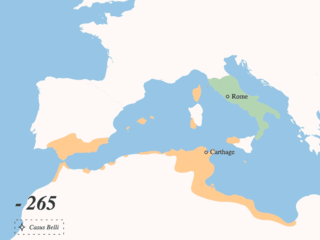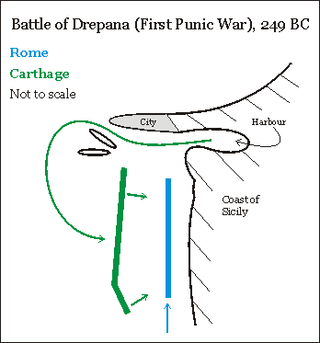
The siege of Drepana took place from about 249 to 241 BC during the First Punic War.

The siege of Drepana took place from about 249 to 241 BC during the First Punic War.
Drepana (today's Trapani) and Lilybaeum (today's Marsala) were two Carthaginian naval strongholds at the western end of Sicily that came under prolonged Roman attack.
During the beginning of the siege, the naval victory of the Carthaginians over the Roman Republic at the Battle of Drepana destroyed the Roman naval blockade and allowed the Carthaginians to provide support for the two besieged ports via the sea. The access by land to Drepana was limited by the presence of Mount Eryx. So land access to Drepana was contested by both armies with the Romans eventually prevailing.
In 241 BC, the Romans under Gaius Lutatius Catulus had rebuilt their fleet and intensified their siege of Drepana forcing the Carthaginians to send a fleet to support the town. [1] The fleet from Carthage was intercepted and destroyed by the newly built Roman fleet during the Battle of the Aegates Islands, effectively ending the First Punic War.

The First Punic War was the first of three wars fought between Rome and Carthage, the two main powers of the western Mediterranean in the early 3rd century BC. For 23 years, in the longest continuous conflict and greatest naval war of antiquity, the two powers struggled for supremacy. The war was fought primarily on the Mediterranean island of Sicily and its surrounding waters, and also in North Africa. After immense losses on both sides, the Carthaginians were defeated and Rome gained territory from Carthage.

The Punic Wars were a series of wars between 264 and 146 BC fought between the Roman Republic and Ancient Carthage. Three wars took place, on both land and sea, across the western Mediterranean region and involved a total of forty-three years of warfare. The Punic Wars are also considered to include the four-year-long revolt against Carthage which started in 241 BC. Each war involved immense materiel and human losses on both sides.
Hamilcar Barca or Barcas was a Carthaginian general and statesman, leader of the Barcid family, and father of Hannibal, Hasdrubal and Mago. He was also father-in-law to Hasdrubal the Fair.

Adherbal, also known as Atarbas, was the admiral of the Carthaginian fleet which battled the Romans for domination of the Mediterranean Sea during the First Punic War. Polybius identified Adherbal during the Battle of Drepana as the Carthaginian commander-in-chief. He led the Carthaginian fleet to Drepana in Sicily and inflicted a crushing defeat on the Roman consul P. Claudius Pulcher during the naval battle in 249 BC.

The Battle of Cape Ecnomus or Eknomos was a naval battle, fought off southern Sicily, in 256 BC, between the fleets of Carthage and the Roman Republic, during the First Punic War. The Carthaginian fleet was commanded by Hanno and Hamilcar; the Roman fleet jointly by the consuls for the year, Marcus Atilius Regulus and Lucius Manlius Vulso Longus. It resulted in a clear victory for the Romans.
Drepana was an Elymian, Carthaginian, and Roman port in antiquity on the western coast of Sicily. It was the site of a crushing Roman defeat by the Carthaginians in 249 BC. It eventually developed into the modern Italian city of Trapani.
Lucius Manlius Vulso Longus was a Roman general and statesman, who served as consul of the Roman Republic in 256 and 250 BC. He is remembered for his military successes; his military achievements, especially the Battle of Cape Ecnomus, significantly contributed to the victory of the Romans in the First Punic War.
The naval Battle of Drepana took place in 249 BC during the First Punic War near Drepana in western Sicily, between a Carthaginian fleet under Adherbal and a Roman fleet commanded by Publius Claudius Pulcher.
The Battle of the Aegates was a naval battle fought on 10 March 241 BC between the fleets of Carthage and Rome during the First Punic War. It took place among the Aegates Islands, off the western coast of the island of Sicily. The Carthaginians were commanded by Hanno, and the Romans were under the overall authority of Gaius Lutatius Catulus, but Quintus Valerius Falto commanded during the battle. It was the final and deciding battle of the 23-year-long First Punic War.
Aulus Atilius Caiatinus was a Roman general and statesman who achieved prominence for his military activities during the First Punic War against Carthage. As consul in 258 BC, he enjoyed several successes in Sicily, for which he later celebrated a triumph. He undertook further campaigning in Sicily both at sea and on land during a second consulship and then as dictator, becoming the first Roman dictator to lead an army outside mainland Italy.
The Treaty of Lutatius was the agreement between Carthage and Rome of 241 BC, that ended the First Punic War after 23 years of conflict. Most of the fighting during the war took place on, or in the waters around, the island of Sicily and in 241 BC a Carthaginian fleet was defeated by a Roman fleet commanded by Gaius Lutatius Catulus while attempting to lift the blockade of its last, beleaguered, strongholds there. Accepting defeat, the Carthaginian Senate ordered their army commander on Sicily, Hamilcar Barca, to negotiate a peace treaty with the Romans, on whatever terms he could negotiate. Hamilcar refused, claiming the surrender was unnecessary, and the negotiation of the peace terms was left to Gisco, the commander of Lilybaeum, as the next most senior Carthaginian on the island. A draft treaty was rapidly agreed upon, but when it was referred to Rome for ratification it was rejected.
The siege of Lilybaeum lasted for nine years, from 250 to 241 BC, as the Roman army laid siege to the Carthaginian-held Sicilian city of Lilybaeum during the First Punic War. Rome and Carthage had been at war since 264 BC, fighting mostly on the island of Sicily or in the waters around it, and the Romans were slowly pushing the Carthaginians back. By 250 BC, the Carthaginians held only the cities of Lilybaeum and Drepana; these were well-fortified and situated on the west coast, where they could be supplied and reinforced by sea without the Romans being able to use their superior army to interfere.
Lucius Junius Pullus was a politician and general of the Roman Republic. He was consul in 249 BCE together with Publius Claudius Pulcher. He and his consular colleague fought in the ongoing First Punic War.
The Battle of the Port of Carthage was a naval battle of the Third Punic War fought in 147 BC between the Carthaginians and the Roman Republic.
The Roman withdrawal from Africa was the attempt by the Roman Republic in 255 BC to rescue the survivors of their defeated expeditionary force to Carthaginian Africa during the First Punic War. A large fleet commanded by Servius Fulvius Paetinus Nobilior and Marcus Aemilius Paullus successfully evacuated the survivors after defeating an intercepting Carthaginian fleet, but was struck by a storm while returning, losing most of its ships.
The naval Battle of Phintias took place in 249 BC during the First Punic War near modern Licata, southern Sicily between the fleets of Carthage under Carthalo and the Roman Republic under Lucius Junius Pullus. The Carthaginian fleet had intercepted the Roman Fleet off Phintias, and had forced it to seek shelter. Carthalo, who heeded the warning of his pilots about impending storms, retired to the east to avoid the coming weather. The Roman fleet did not take any precautions and subsequently was destroyed with the loss of all but two ships. The Carthaginians exploited their victory by raiding the coasts of Roman Italy until 243 BC. The Romans did not mount a major naval effort until 242 BC.
Gisco was a Carthaginian general who served during the closing years of the First Punic War and took a leading part in the events which sparked the Mercenary War. He was a citizen of the city state of Carthage, which was located in what is now Tunisia. His date of birth and age at death are both unknown, as are his activities prior to his rise to prominence towards the end of the First Punic War.